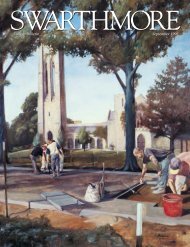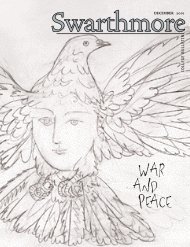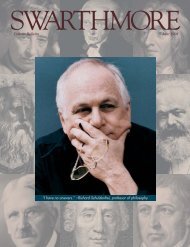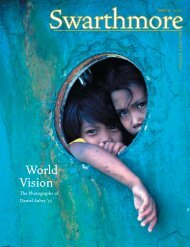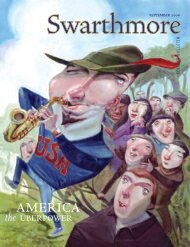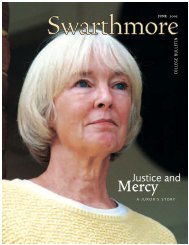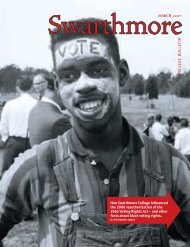Vietnam
Swarthmore College Bulletin (June 2006) - ITS
Swarthmore College Bulletin (June 2006) - ITS
- No tags were found...
You also want an ePaper? Increase the reach of your titles
YUMPU automatically turns print PDFs into web optimized ePapers that Google loves.
PEACE, INDEPENDENCE, ANDTHE PROMISE OF PROSPERITY<strong>Vietnam</strong>’s Declaration of Independence,delivered as a speech by Ho Chi Minh onSept. 9, 1945, begins:My countrymen,“All men are created equal. They areendowed by their Creator with certaininalienable rights, among these are Life,Liberty, and the pursuit of Happiness.”This immortal statement was made inthe Declaration of Independence of theUnited States of America in 1776. In abroader sense, this means: All thenations on the earth are equal frombirth; all the nations have the right tolive, to be happy and free.Having suffered millions of war casualties,<strong>Vietnam</strong> is basking in peace. Having foughtfor decades against foreign domination, itspeople are proudly independent. And, havingembraced economic reforms in the late1980s that ended collective agriculture andopened the door to private enterprise, theyare enthusiastically—almost giddily—freeto make money.Despite these improved conditions, theSocialist Republic of <strong>Vietnam</strong> remains aone-party state, and all power flows fromHanoi. Although our well-educated andarticulate guides—all government employees—feltfree to criticize past governmentactions, they have no way to challenge theregime politically. They, like many <strong>Vietnam</strong>ese,face the decision of whether to jointhe Communist Party—a sure path toupward mobility, but one that has thedownside of increased Party scrutiny andcontrol.Bill Van Stone ’51 noted that Party influenceseemed to be “in the political realmand not much in the economy.” His son,David Van Stone ’88, was impressed by theenergy of the <strong>Vietnam</strong>ese people: “There’san excitement about the future, but it’s notclear what that future will be. They are on afast train.”But David Peterson ’61 worried that“jealousies and class issues may develop aswealth increases,” hoping that the government“might be able to prevent some ofthose inequalities from occurring.”A whole new world has opened up for<strong>Vietnam</strong>. Peace, independence, and thepromise of prosperity are their newfoundfreedoms—the kind of freedoms that aredefined by the absence of evils rather thanthe presence of truly democratic forms ofgovernment. For most <strong>Vietnam</strong>ese, half ofwhom were born after 1975, those sorts offreedoms seem superfluous. They have businessto attend to first.“This may be the beginning of a goldenage for <strong>Vietnam</strong>, when it will decide its ownfuture,” Jeffrey Scheuer ’75 said. “They’restarting from a point where there isn’t a lotof stratification in society—ethnically, religiously,and economically. As an American, Ienvy the unity here.”Paul Armington ’62 viewed <strong>Vietnam</strong> as“a living laboratory for how you can leadsocial and economic change in the ThirdWorld.” Because of forced isolation after the“American War—the U.S. trade embargowas lifted in 1993 and normal diplomaticties began in 1995—<strong>Vietnam</strong> learned todevelop its economy without much help orinterference from the West. Armington sawthis as a plus: “Their backs were to the walland they had to do it on their own. Theymade mistakes and learned from those mistakes.Other Third World countries have alot to learn from <strong>Vietnam</strong>.”june 2006 : 19



